No Results Found
The page you requested could not be found. Try refining your search, or use the navigation above to locate the post.
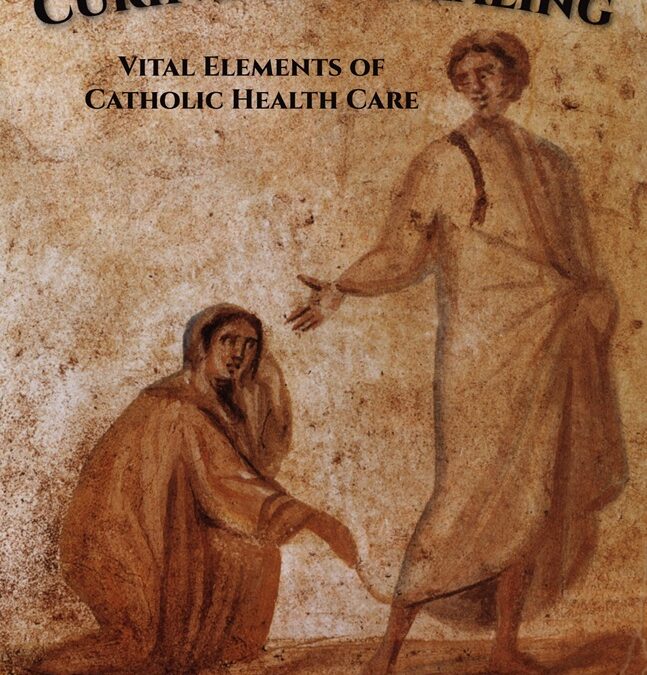

In this research, the significance of curing and healing will be explored with an emphasis on how both are vital to Catholic health care. This essay aims to show that only by embracing both components can health care professionals truly care for the whole person. Moreover, Christian health care professionals ought to follow Christ’s example in order to serve in His mission of caring holistically for those that are ill. As Luke’s account of the Haemorrhoissa (Lk 8:42-48) not only provides a vignette distinguishing between curing and healing, but also an excellent example of how Christ attended to both elements, this essay will interpret this story in order to gain insight into the indispensability of both to whole person Catholic health care. Further, examples extracted from palliative care, an area of health care where curing and healing can be clearly distinguished, will be used to illustrate these elements in practical terms.
Paperback: $12.95 | Kindle: $9.99
“Crafted with scholarly exegetic style, yet pithy and approachable, this timely publication should be read by any health professional who gazes seriously upon their career and sees a vocation.” – Vanco Hristov BSc (Hons), GradDipPsych, PhD candidate, The University of Melbourne
“In Eric Manuel Torres’ book, Curing and Healing, there is a good discussion of this difference which, on the whole, turns on the difference between curing an ailment and healing the whole person, a difference very ably illustrated at the end of the book. Thus, implicitly, there is a growing possibility that genuine Catholic Healthcare offers a uniquely, ethically sound approach to many of life’s difficult health crises. Furthermore, the encompassing vision of the person which inspires and informs the vocation of Catholic Healthcare, draws as it does on ancient and modern wisdom, whether of Christ or His Church, philosophy and medicine, and so is ever ready to explore and to answer the question of meaning and, if necessary, the need for reconciliation before death. As Torres himself says so well: ‘finding meaning in illness is as core to healing as the skeletal system is to our bodies’ (p. 20).” – Francis Etheredge, Catholic married layman, father of 11, 3 of whom are in heaven and an author of 17 books on Amazon: https://enroutebooksandmedia.com/francisetheredge/.
“This book demonstrates a highly developed understanding of the identity and mission of Catholic Healthcare.” – Dr. Frances Baker, RSM, STD, Senior Lecturer in Moral Theology and Systematic Theology at Catholic Theological College/University of Divinity (Australia)
“Torres has written a readable and cogently argued research essay. His conclusion that “healing…is multidimensional, and may include the physical yet not always” is sound. So is his general understanding of Catholic theology, especially of implications of the Incarnation, as applied to health care delivery.” – Rev. Dr. Bernard Teo, C.Ss.R., STD., Lecturer in Moral Theology at Yarra Theological Union/University of Divinity (Australia) and Te Kupenga – Catholic Theological College (New Zealand)
The page you requested could not be found. Try refining your search, or use the navigation above to locate the post.
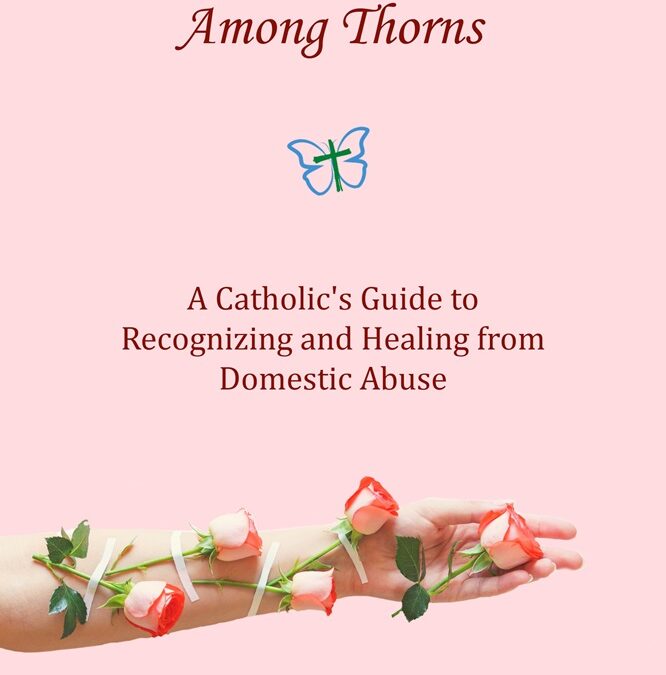
In this book, Jenny duBay helps survivors of intimate partner violence identify their situation and begin to heal. With empathy and compassion, she covers such topics as what domestic abuse is, the trauma of sexual assault and coercion, verbal attacks and isolation, and the evils of manipulative control within intimate relationships. She also discusses details on what the Catholic Church teaches about personal dignity, sacramental marriages, and the nature of domestic abuse. Jenny reveals the impact intimate abuse has on targets, providing practical and Christ-centered ways heal—no matter where a survivor may be on her journey.
For those who have had to leave their relationships, Jenny discusses the annulment process and what it truly means—including the immense healing it can provide. For individuals who hope reconciliation can happen, she thoroughly and compassionately discusses the possibility of abusers changing their ways, helping readers determine what authentic repentance looks like—and when so-called repentance is just another abuse tactic. Whether you’re still married or have had to separate yourself from a toxic relationship, Don’t Plant Your Seeds Among Thorns helps you navigate trauma while providing resources and gentle guidance toward Christ-centered healing and empowerment of our true self, as God created you to be.
Paperback: $19.95 | Kindle: $9.99
“The Catechism observes that God’s original plan for marriage has been ‘seriously disturbed’ by sin (1608). As a result, man and woman’s ‘mutual attraction, the Creator’s own gift, changed into a relationship of domination and lust’ (1607). In Don’t Plant Your Seeds Among Thorns: A Catholic’s Guide to Recognizing and Healing from Domestic Abuse, Jenny duBay compassionately discusses the true nature of marriage while providing resources and hope for those who aren’t experiencing authentic companionship in their relationships. Drawing from the Catechism, the Theology of the Body, and various other trusted Catholic resources, Jenny opens the way to genuine healing for those seeking freedom from abusive relationships.” – Christopher West, Th.D., best-selling author, popular podcaster, and President, Theology of the Body Institute
“Jenny duBay has written a marvelous book, Don’t Plant Your Seeds Among the Thorns, that covers the topic of intimate partner abuse thoroughly and sensitively. As a survivor herself, she understands its deceitful trap, its traumatic impact as well as the courageous steps necessary to escape it. Significantly, her book addresses the problem from the point of view of the Christian faith. Jenny duBay plumbs the meaning of scripture and helps victims and survivors connect their faith with the evil they have experienced. She emphasizes the need for spiritual healing and guides the wounded along pathways to a new and regenerated life. Her book should be required reading for all parish ministers.” – Fr. Charles W. Dahm, O.P., Director of Archdiocese of Chicago Domestic Violence Outreach, from the “Foreword”
“Jenny duBay has created a tender wake-up call for wounded wives in abusive marriages. She brilliantly blends Holy scripture and church teachings with the truth around abuse in marriage. Her candid psychoeducation is balanced with gentle, directed encouragement toward spiritual truths that wives need to understand because so often misinformed church leaders and culture are teaching the opposite. She doesn’t skirt around the toughest of issues – sexual violence in marriage. Jenny’s heart for women to find their assertive spirit through Jesus and find empowerment to make choices based on safety is very clear. I highly recommend this book to any Catholic woman who is struggling to make sense of a confusing marriage.” – Bonny Logsdon Burns, Certified Partner Coach through the Association of Partners of Sex Addicts Trauma Specialists and co-host of Hope for Wives podcast.
“With candor and conciseness, Jenny duBay has written a book that brings clarity and practical wisdom for men and women who may find themselves stuck in the suffocating cycle of domestic abuse. I am certain that this compendium of insight into abuse, the Church’s teachings on marriage, and steps to escape such physical and mental violence will assist many in pursuing the respite they desperately need and in a manner that corresponds with the Church’s longstanding wisdom.” -Angela Erickson, host of the Integrated with Angela podcast
“In a caring and heartfelt manner, Jenny duBay has gifted us with a comprehensive book about intimate partner violence, from a Catholic perspective. She provides practical information and describes ways to recognize an unhealthy relationship and journey to a space of hope and healing for all harmed or who cause harm in this way. Also, it is a must-read for all those accompanying people on their path to live a safe and sacred life free of violence.” – Sharon O’Brien, Ph.D., Co-Founder and Executive Director of Catholics for Family Peace, Initiative of National Institute for the Family
“In ministry, we encounter women daily who are living in marriages characterized by manipulation, blame, coercion, denial and other forms of violence – emotional and spiritual as well as physical or sexual violence. These abusive experiences are a profound violation of our human dignity! Intimate partner violence leaves women feeling confused, alone, filled with despair and even suicidal. We are grateful to Jenny duBay for writing this book. With a solidly Catholic voice, Jenny addresses the oft-underemphasized reality of domestic violence and spousal abuse within Catholic marriages. The truth, clarity and practical advice contained in this book make it an invaluable resource for those enduring such trauma, and for those of us walking alongside of God’s wounded daughters.” – De Yarrison, CPCC, foundress of You Are Made New Ministry and Laura Ercolino, foundress of Hope’s Garden
“Jenny duBay’s Don’t Plant Your Seeds Among Thorns: A Catholic’s Guide to Recognizing and Healing from Domestic Abuse is not simply a book, but a lifeline for those seeking healing, understanding, and hope in the context of the Catholic Faith. Throughout this work the author’s wisdom and empathy shine through each page, which results in the illumination of a definitive path towards the reclaiming of one’s dignity and becoming a survivor of abuse, especially abuse within the institution of marriage.” – Christina M. Sorrentino, author of Belonging to Christ: Catholic Poetry and contributor to Missio Dei’s book, The Eucharistic Revival Project
“Should Catholics stay in an abusive relationship? Jenny duBay answers this question with such clarity and heart in her book Don’t Plant Your Seeds Among Thorns. Comprehensive, practical and healing, this book is a must-read for anyone suffering from an abusive relationship. Coming from an expert and survivor of domestic abuse, the author will guide you as you seek to understand, forgive, move on and heal from the trauma of abuse. There is hope and healing even when all else seems lost.” – Jocelyn Soriano, author of various self-help and Catholic books including Mend My Broken Heart and 366 Days of Compassion, book reviewer, and writer of the Patheos column “Beloved”
“Jenny duBay is an author who writes with a deep understanding of God’s mercy, through which she hopes to communicate God’s love to others. She has a particular calling to provide healing to those who have suffered from domestic violence, and a desire to provide hope to those who feel forsaken. For any who are seeking inspiration or direction from the brokenness of life, I whole-heartedly endorse her writings. In her word’s, God’s love is waiting for you.” – Michael Snellen, founder of I AM Catholic and Catholic Creators
“Jenny duBay’s book Don’t Plant Your Seeds Among Thorns: A Catholic’s Guide to Recognizing and Healing from Domestic Abuse was the focus of a summer 2024 women’s book study in my parish. The group was initially 4 women but grew to 11 after advertising the study in the parish bulletin. The women attended for various reasons and all found the reading to be very informative, consoling, and hopeful. While the topic can be difficult to think and read about, Jenny presents it in a clear, compassionate way while incorporating the truths of Catholic teaching. Meaningful conversations came about during our group meetings that helped those on the path of healing. As a result, our group is considering doing this book study again soon to revisit and go deeper with the topic as well as to invite others who may not have been able to attend initially. I recommend any women’s or men’s groups to consider taking the time to read and discuss this book as a way to educate themselves and to shed light on a grave issue happening right in their own parishes.” – Kim Ferguson, Women’s Book Study Leader, Diocese of Lansing
 Jenny duBay is an ICF-accredited trauma-informed Catholic life coach, certified Deconstructing Gaslighting Specialist (C-DGS), a certified narcissistic abuse specialist, and earned her B.A. in Catholic Theology from Holy Apostles College & Seminary and Catholic Distance University. In addition to her coaching ministry, Jenny is the foundress of Create Soul Space, a website designed to help cultivate awareness of domestic violence within a Catholic setting. Jenny is the domestic violence support group facilitator at Hope’s Garden, is associated with Catholics for Family Peace and works with various organizations within the Church to support survivors of domestic violence. Author of the Create Soul Space and Prodigal Parishioner blogs, Jenny also writes for Missio Dei along with various other Catholic publications including Dan Burke’s SpiritualDirection.com
Jenny duBay is an ICF-accredited trauma-informed Catholic life coach, certified Deconstructing Gaslighting Specialist (C-DGS), a certified narcissistic abuse specialist, and earned her B.A. in Catholic Theology from Holy Apostles College & Seminary and Catholic Distance University. In addition to her coaching ministry, Jenny is the foundress of Create Soul Space, a website designed to help cultivate awareness of domestic violence within a Catholic setting. Jenny is the domestic violence support group facilitator at Hope’s Garden, is associated with Catholics for Family Peace and works with various organizations within the Church to support survivors of domestic violence. Author of the Create Soul Space and Prodigal Parishioner blogs, Jenny also writes for Missio Dei along with various other Catholic publications including Dan Burke’s SpiritualDirection.com
(Photo credit: Brian Strickland)
The page you requested could not be found. Try refining your search, or use the navigation above to locate the post.

These foundational principles were written with the intention of delineating how to be a faithful, healthy, charitable, and truthful disciple of Jesus. Each one is intended to be understood in relationship with the other principles from the perspective of our life of faith as each bead in a decade of the rosary is to be prayed in relationship to the other beads from the perspective of a mystery of faith. Practicing them is like putting “on the whole armor of God, that you may be able to stand against the wiles of the devil.” (Ephesians 6:10-11)
Paperback: $14.95 | Kindle: $9.99
“Fr. Peter Samuel Kucer, MSA, has produced quite a grand opus in his collection of works on Marian Devotion, Catholic Church History, East and South East Asian History, Catholic Apologetics, Protology and the Priesthood, Western Civilization, Political Science, and now foundational principles on discipleship. Each of his books provides wisdom for the beginner and clarity for the educated.” – Dr. Sebastian Mahfood, OP, author of The Narrative Spirituality of Dante’s Divine Comedy
The page you requested could not be found. Try refining your search, or use the navigation above to locate the post.
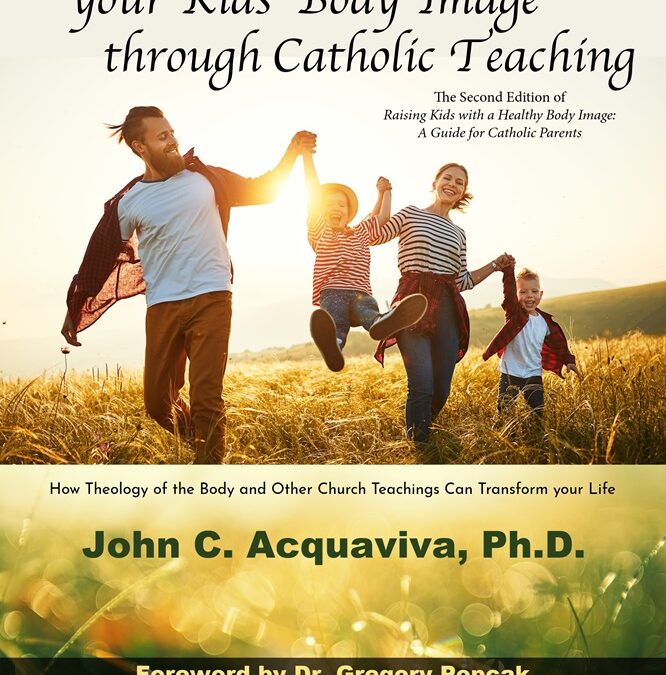
Improving your Kids’ Body Image through Catholic Teaching: How Theology of the Body and Other Church Teachings Can Transform your Life is the unique approach to the body image crisis that impacts many children. From a young age, our kids are under immense pressure from a variety of sources that can determine the value of their bodies. But God has something to say about this as well. Saint John Paul II’s wonderful teaching known as Theology of the Body is the book’s guiding force. Along with Scripture and the Church’s Sacraments, this book is an excellent parenting tool to guide your child so they see the worth of their bodies as designed by our Creator. In addition, this book discusses the numerous causes of a poor body image and includes chapters on how to instill fitness and sound nutrition into your family life.
Paperback $16.99 | Kindle $9.99
Listen to “Episode 16: Cynthia Toolin-Wilson interviews John Acquaviva concerning his book Raising Kids with a Healthy Body Image (February 27, 2020)” on Spreaker. Ave Maria Radio’s Catholic Connection Interview with Teresa Tomeo on Improving Your Body through Catholic Teaching Listen to “John Acquaviva Interview concerning his book Improving Your Body Image Through Catholic Teaching (December 16, 2019)” on Spreaker.
Interview with Ken Huck on Radio Maria’s Meet the author. May 18, 2017.
SueAnn Howell, “St. Matthew parishioner pens guide for Catholic parents on raising kids with a healthy body image,”
“Building upon the timeless teachings of the Church, edified by saints and scripture, and penned from a practical parent’s perspective, Improving your Kids’ Body Image through Catholic Teaching is a great tool to help you raise happy, healthy and holy children. John C. Acquaviva takes on challenging topics with compassion and candor in a faith-filled yet totally accessible way. Stop shying away from the tough yet essential conversations and serve your family with an equipped and inspired perspective!” – Lisa M. Hendey, Founder of CatholicMom.com and author of The Grace of Yes
“Rooted in the Truth of the Catholic Church, this inspiring book offers everything parents need to help their children become the body-confident people God created them to be. Using Saint Pope John Paul II’s Theology of the Body, Scripture, and the teaching of the Church, this must-read will help you and your child navigate the minefield of body image pitfalls our culture perpetuates to rediscover the God’s purpose for their bodies–to glorify Him. Spiritual and practical, this edifying book belongs on every parent’s bookshelf.” – Kate Wicker, Journalist & Speaker Author of Weightless: Making Peace With Your Body
“There is an epidemic of distorted body image fed by popular culture and causing great distress among far too many of our sons and daughters. Dr. John Acquaviva delivers it a devastating one-two punch in his masterful melding of the findings of modern science with the timeless wisdom of the Catholic Church on the true dignity and importance of the human body in harmony with the soul. Every Catholic parent should read, re-read, and put to use Improving your Kids’ Body Image through Catholic Teaching. Indeed, every parent — period.” – Kevin Vost, Psy.D., author of Fit for Eternal Life and Memorize the Mass!
As a model and actor who travels speaking about his Catholic faith I am intimately familiar with the destructive lie the media feeds us daily about body image and the meaning the life. This book is a must-read for anyone raising children or those simply seeking to better understand how to navigate through this physically and spiritually dangerous culture war we find ourselves in. – Mario St. Francis Herrera, Model & Actor turned Lay Catholic Evangelist
Improving your Kids’ Body Image through Catholic Teaching is a book all parents need, whether they are Catholic or not. John C. Acquaviva goes right to the heart of the issues that can plague a young person with despair because of a negative body image. In a conversational tone, he sets us back on track with Catholic teaching and shows how to appreciate our bodies as the gifts that they are.” – Dr. Stacy Trasancos, Chair of the Science Department, Kolbe Academy
 John holds a PhD in exercise science and is a professor at Wingate University.
John holds a PhD in exercise science and is a professor at Wingate University.
His courses include Anatomy & Physiology, Strength & Conditioning, Sports Nutrition, Exercise Physiology, and Weight Loss, Weight Gain & Body Image.
Over the years, he has given hundreds of presentations to fitness professionals, prospective teachers, and Catholic Church adult congregations, youth groups, and campus ministries.
His other book, Improving Your Body Image Through Catholic Teaching, is currently available on Amazon.
Dr. Acquaviva resides in Matthews, NC, with his wife Alecia and three children, Clare, Luke and Abigail.
The page you requested could not be found. Try refining your search, or use the navigation above to locate the post.
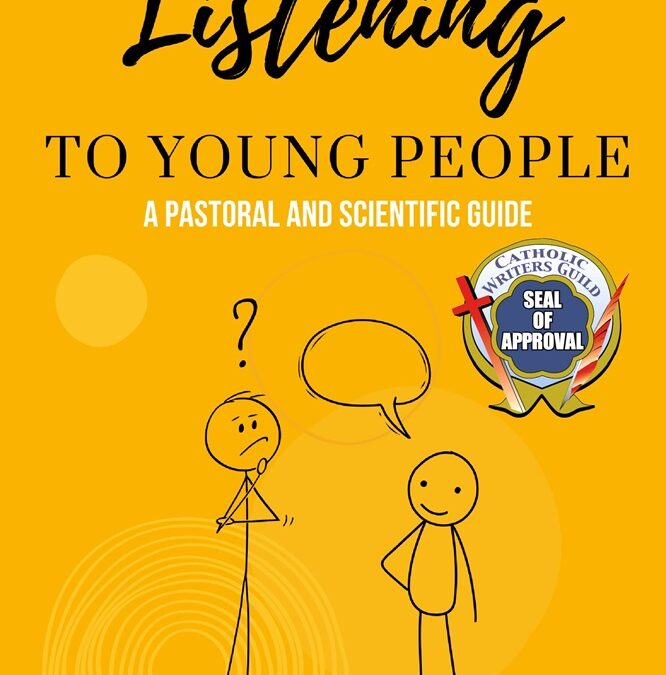


Listening is a form of encounter that allows us to be with another person, to see through their eyes, and to journey with them. The Art of Listening to Young People uniquely blends extensive scientific research with pastoral experience and theology to provide guidance and inspiration for youth ministers, spiritual directors, formation advisors, therapists, and anyone else who desires to better accompany young people today.
Paperback: $20 | Kindle: $9.99
“The book’s cogent presentation of the importance of listening to the young, as an essential way of accompanying and leading them, manifests an attentive response to Pope Francis’s reflections on the education of children, where he says: ‘The real question, then, is … where [our children] are existentially, where they stand in terms of their convictions, goals, desires and dreams. The questions I would put to parents are these: ‘Do we seek to understand ‘where’ our children really are in their journey? Where is their soul, do we really know? And above all, do we want to know?” (Amoris Laetitia, 261; citing General Audience Catechesis, May 20, 2015)'” – Cardinal Christophe Pierre, Apostolic Nuncio
“The Art of Listening to Young People is an integrated contribution, confidently grounded in the complementarity of faith and reason, which unites authentic Christian principles with astute practical wisdom, supported by scientific research. This work gives a refreshing perspective on encountering young people with compassion and clarity – committed to receiving another as a human person with dignity and facing the challenges of the times with the Gospel imperative to “Be not afraid!” For anyone ministering to young people, this piece serves as a most valuable guide in navigating the shadows of today’s culture with the bright light of truth and Christian charity – a most important topic for this age of the Church. It’s a deeply beneficial and encouraging read!” – Monsignor James P. Shea, President, The University of Mary
“‘I hear you.’ How often does this expression mask the reality that we have heard words with our ears but have not really listened to the person in front of us? The Art of Listening to Young People calls all who are called to accompany young people to understand them better and truly listen to what they are saying. Drawing from psychology and the social sciences as well as from great leaders of the Catholic tradition, the authors call us to care enough to make sure that it is obvious to young people that we are truly listening to them. While there are skills to learn, we are not presented with a recipe, but with good advice for improving in what is truly an art, as the title says. Thanks to Amoris Christi, a program that is expert in working with young people, for producing this great work.” – Fr. Alfredo I. Hernández, Rector/President, St. Vincent de Paul Regional Seminary, author of Formation Activities and Catholic Seminarians
“The book The Art of Listening to Young People is a profound helping hand and resource book for those who wish to accompany young people in one-on-one settings like mentoring, formation, spiritual direction or counseling.” – Bishop Joy Alappatt, St. Thomas Syro-Malabar Eparchy of Chicago
 Amoris Christi is a Catholic, nonprofit organization devoted to the formation of Christian leaders, based in Delray Beach, FL. It is an affiliate of Jesus Youth, which is an international Catholic movement of pontifical right. This book was authored by Amoris Christi’s multidisciplinary research wing, the Institute for Excellence.
Amoris Christi is a Catholic, nonprofit organization devoted to the formation of Christian leaders, based in Delray Beach, FL. It is an affiliate of Jesus Youth, which is an international Catholic movement of pontifical right. This book was authored by Amoris Christi’s multidisciplinary research wing, the Institute for Excellence.
The page you requested could not be found. Try refining your search, or use the navigation above to locate the post.
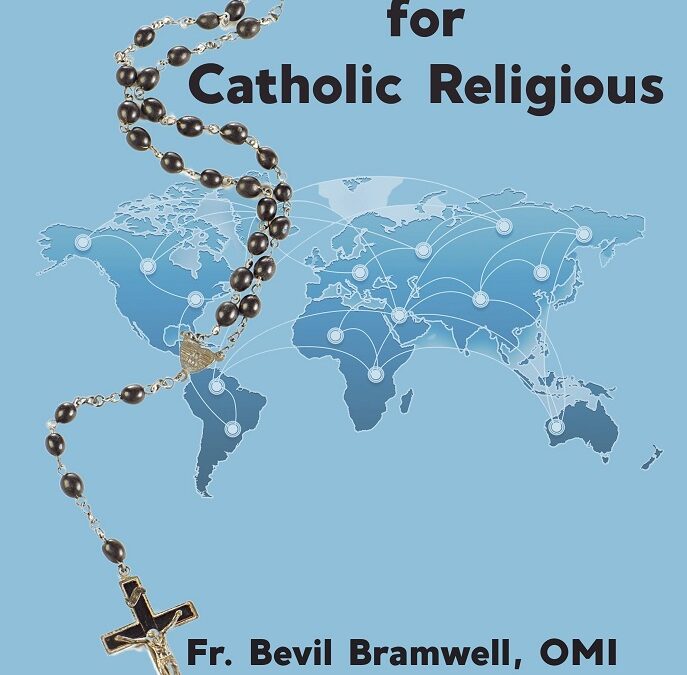

Reflecting on the theology of the presence of Christ in the world, particularly from the point of view of the aesthetics of religious life as understood from the writings of Hans Urs von Balthasar, John Paul II and Benedict XVI, Fr. Bramwell explains that a particular problem for Religious in the 21st century is that they are trying to pray, live and work in an age that is antagonistic to such a life. If religious life is ever separated from its relation to and expression of the life of Christ, then it is no longer religious life as the Church understands it. For this reason, Fr. Bramwell gets to grips across the pages of this book with the existential challenges that face serious Religious every day.
Paperback: $19.95 | Kindle: $9.99
“Fr. Bramwell’s expression of the intensity and beauty of religious life is an inspiration to all the faithful, strengthening their love and giving them hope for joyful and eternal communion with the Triune God.” – Dr. Cynthia Toolin-Wilson, author of Survivor: A Memoir of Forgiveness
The page you requested could not be found. Try refining your search, or use the navigation above to locate the post.